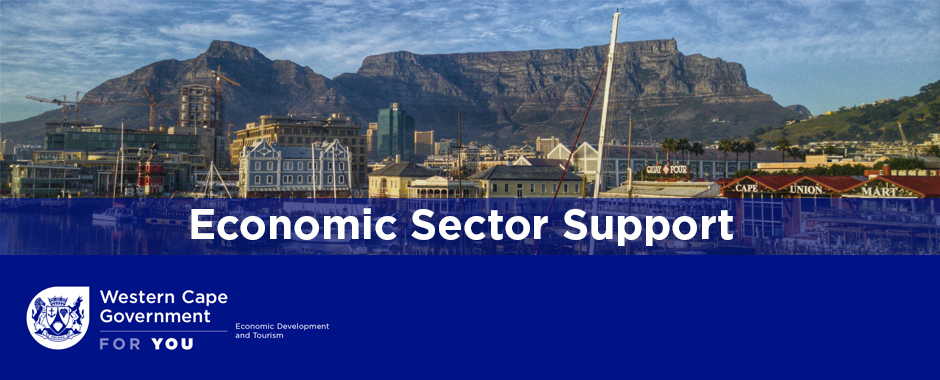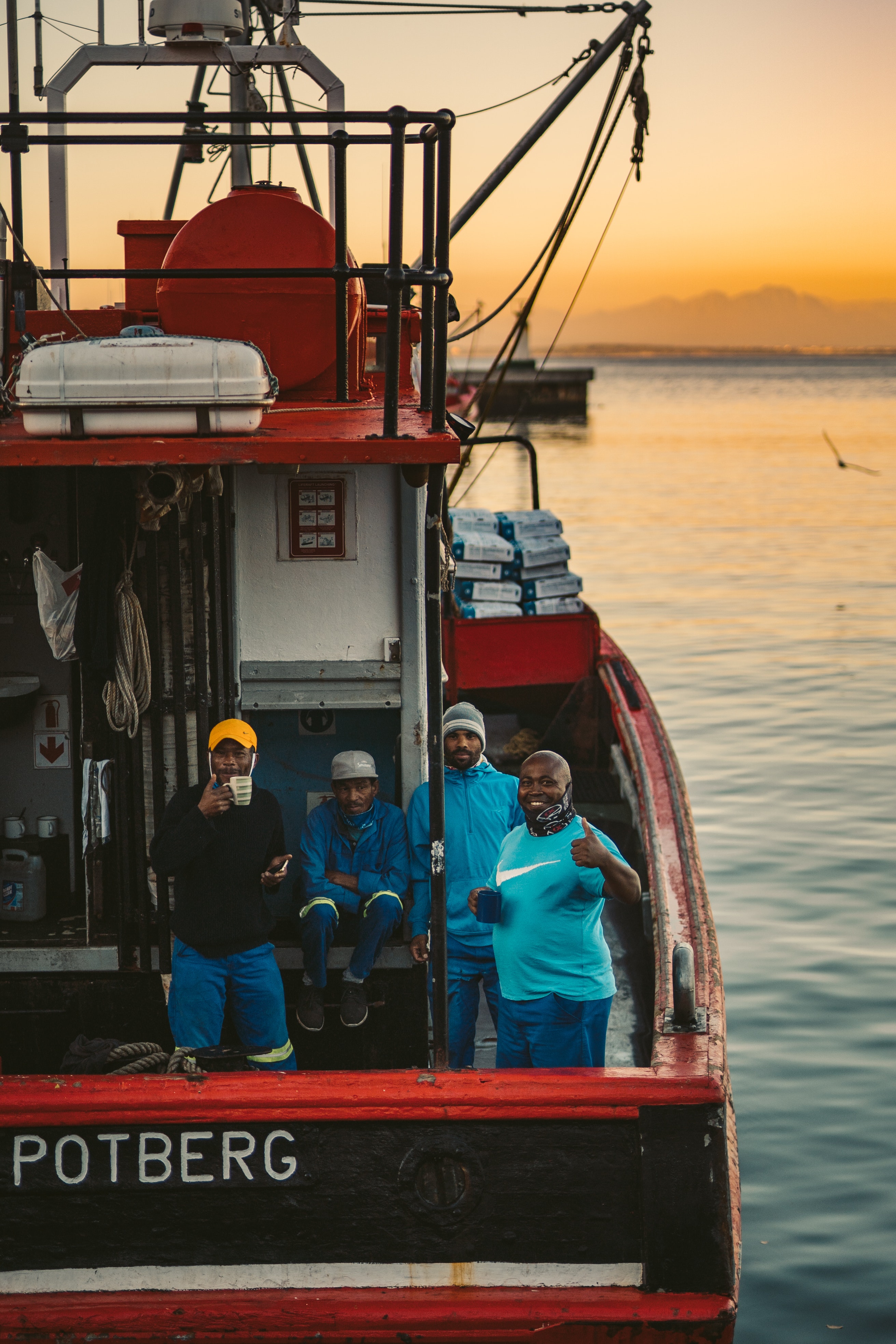Economic Sector Support: Oceans Economy

What is the Oceans Economy?
Oceans Economy looks at various economic sectors and industries that are linked to the ocean. It plays an important role in supporting exports, tourism and people’s livelihoods.
Who are we?
To achieve the objective of growing the contribution of the Oceans Economy activities to the Western Cape economy we follow a programmatic approach across the coastal districts, which will be informed by stakeholder input. The Western Cape’s Oceans Economy strategy looks at several factors such as stakeholder engagement, environmental sustainability, quality market and value-chain research, private sector involvement, and identification of market-led economic opportunities. The key focus industries include:
![]()
Key programmes and initiatives:
The Western Cape’s Oceans Economy strategy is underpinned by several factors such as:
Industry Action Platforms
Given the size and importance of the Oceans Economy sub-sectors and industries for the Western Cape economy, stakeholder engagement platforms are critical to unlocking growth opportunities. The Western Cape Oceans Economy Working Group has been established with an objective of fulfilling this role. The working group, in partnership with the coastal municipalities, will be expanded to include more private sector stakeholders, with an objective of discussing implementation of economic opportunities.
Research and Sector Insights
There is so much Oceans Economy research available that has been prepared by several consultants for various government departments and municipalities. The emphasis will be on pulling together existing information and packaging it in a user-friendly format for the stakeholders to be informed of what is happening. This will be implemented through the value-chain capacity building programme and the market development programme. The objective is to generate market and sector intelligence across several prioritised value-chains, and to share this information with the stakeholders through various channels.
Policy
A review of various existing growth constraining policies is critical if the Oceans Economy opportunities are to benefit the coastal communities who often rely solely on the ocean for food and jobs. Emphasis will be put on close monitoring of all new legislation that is relevant to supporting the growth of all the Oceans Economy sub-sectors and industries. In partnership with the private sector, through the industry partnership programme, policy suggestions and/or amendments will be made to relevant authorities through the proper channels.
Investment and Trade Promotion
Greater emphasis will be placed on supporting the growth of exports of both goods and services. Growing exports will require great investment to support the Partnerships with the Development Finance Institutions and other spheres of government will be key to ensure ease of access to the land pockets and infrastructure under their control for investment recruitment purposes.
Catalysts Identification and Co-ordination
Targeted stakeholder engagements/workshops will be held across all coastal districts to continuously identify and refine a list of catalytic initiatives. The engagements will ensure that the private sector continues to lead and government focuses on supporting through the creation of an enabling environment for businesses to do business.
Industry Incentives
National government has developed several incentives to support various sectors in the economy, including some under the Oceans Economy umbrella. What is key to understand here is that, incentives are not necessarily limited to money. All spheres of government will have to look inside their toolbox to see if there aren’t other ways of providing incentives to businesses – municipalities are better positioned to ensure that this happens.
Key Opportunities
Key opportunities have been identified through research and stakeholder input includes:
- Coastal and marine tourism product and route development;
- Expanded manufacturing of large leisure boats, catamarans;
- Private sector investment into small harbours in partnership with local communities - securing of tenure, unencumbered openness to big ideas;
- Ship/boat repair and maintenance, including potential refurbishments related to new technologies;
- Expanded aquaculture production and processing: abalone, mussels, oysters, finfish, kelp, other seaweed;
- International cruise ship work;
- Jobs related to marine protection and patrol services, lifesaving, monitoring/enforcement, anti-poaching, research;
- Ocean sports and associated activities;
- Great African Sea Forest (kelp forest) UNESCO World Heritage Site;
- Maritime education as an economic opportunity, including "export".
Current Projects and Initiatives
The Department of Economic Development and Tourism are currently focusing on the following projects and initiatives:
National Oceans Economy Master Plan
The South African Government initiated Operation Phakisa in 2014 in an attempt to stimulate the Oceans Economy. It was a results-driven approach with clear plans and targets, based on the Big Fast Results (BFR) methodology which was successfully implemented in the Economic Transformation of the Malaysian Economy. Whilst the implementation of the detailed plans of Operation Phakisa has had varying successes and impacts, further work is required in some sub-sectors. The development of the Oceans Economy Master Plan builds on the foundation of the initiatives of Operation Phakisa and expands the scope to sub-sectors that had been dealth with during this process.
Western Cape Oceans Economy Working Group
The Western Cape Oceans Economy Working Group meets bi-monthly, with participation by its core members from National Government Department of Tourism (NDT); Department of Environment, Fisheries and Forestry (DEFF); Department of Public Works and Infrastructure (DPWI); Agencies – South African International Maritime Institute (SAIMI); Transnet National Ports Authority (TNPA); Provincial Government – Department of Agriculture (DoA); Department of Environmental Affairs and Development Planning (DEADP); Provincial Agencies: Wesgro; Saldanha Industrial Development Zone; and, the four coastal district municipalities and the local coastal municipalities. Informed by the strategic framework, the working group and other engagement platforms, the Unit has identified a need to focus on partnering with private sector to build capacity to strengthen strategic value chains; develop new markets and expand the existing ones; strengthen the existing or create new industry platforms.
Aquaculture Development Zones
Aquaculture Development Zones (ADZ) help develop the small-scale aquaculture sector. Saldanha Bay has been earmarked for aquaculture value chain activities, with all the relevant authorisations in place and relevant basic infrastructure. The aim is to reduce the cost of doing business in this area.
Related links
https://www.wesgro.co.za/invest/sector/oceans-economy-1
Our Team
For more information on Oceans Economy, please contact:
Ilse van Schalkwyk
Chief Director
Ilse.vanSchalkwyk@westerncape.gov.za
O21 483 9494
Goodwell Dingaan
Director
Goodwell.Dingaan@westerncape.gov.za
Marthinus van Wyk
Deputy Director
Marthinus.VanWyk@westerncape.gov.za
Almarie Klink
Assistant Director



